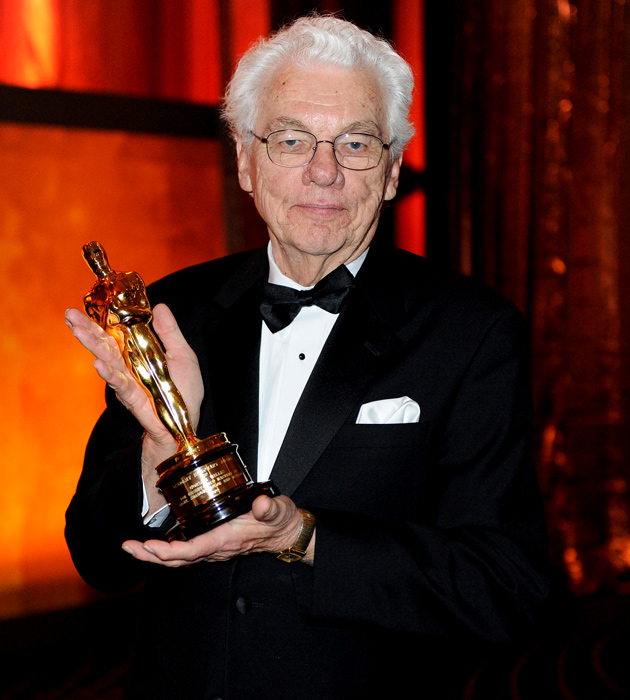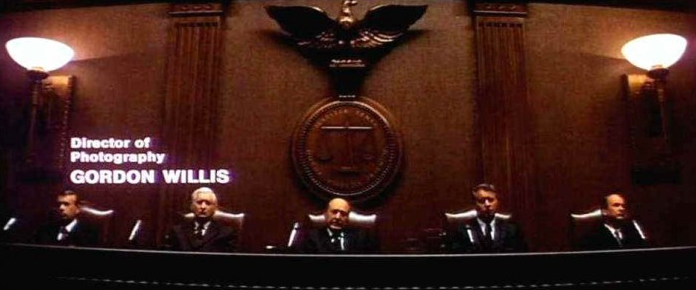Here's one of my personal favorite critics, Tim Brayton, with a gracious crossposting of his lovely obituary for one of the greatest cinematographers who ever lived. - Nathaniel
 It’s not tragic when an 82-year-old man, who had been happily retired for 17 years, following an incredibly strong and well-regarded career, dies. Any of us would be lucky and blessed to have that kind of live and that kind of death. But the loss of Gordon Willis on May 18 is heartbreaking anyway: it’s always heartbreaking when a true genius, visionary, and leader of his field passes away.
It’s not tragic when an 82-year-old man, who had been happily retired for 17 years, following an incredibly strong and well-regarded career, dies. Any of us would be lucky and blessed to have that kind of live and that kind of death. But the loss of Gordon Willis on May 18 is heartbreaking anyway: it’s always heartbreaking when a true genius, visionary, and leader of his field passes away.
Willis was the most important cinematographer of the last 50 years of cinema. I don't know of any clearer or more concise way of putting it. If he'd only shot The Godfather and The Godfather, Part II, a pair of films that fundamentally altered the way people used lighting and focus and the peculiar film stock of '70s American filmmaking, he would be one of the great masters of his field, and his passing a day of mourning for all cinephiles.
A beauty break featuring some of his greatest achievements after the jump...

If he'd only shot the trio of paranoia thrillers with director Alan J. Pakula, Klute and The Parallax View and especially the technically audacious All the President's Men, he'd be one of the great masters of his field.
 Klute (1971)
Klute (1971) All The President's Men (1976)
All The President's Men (1976) The Parallax View (1974)
The Parallax View (1974)
If he'd only shot his extraordinarily gorgeous quartet of black and white movies with Woody Allen - Manhattan, Stardust Memories, Zelig, Broadway Danny Rose - some of them lovingly grain-kissed, some of them hauntingly sharp and clear, all of them so bright and piercingly silvery and sleek that they practically glow, he'd be one of the great masters of his field.
 Manhattan (1979)
Manhattan (1979)Zelig (1983)
 Broadway Danny Rose (1984)
Broadway Danny Rose (1984) Stardust Memories (1980)
Stardust Memories (1980)
But, in fact, he shot all of these, and other great and influential films besides.
If the 1970s can fairly be said to have changed the way that American movies were made, that owes as much to Willis's astonishing new rules for how movies could be photographed as to the contribution of any other individual - if only for their severely underlit rooms, introducing a new way of thinking about shadows and mood that has little to do with the chiaroscuro nightmares of film noir, his early work could only ever be regarded as groundbreaking.
 The Godfather (1972)
The Godfather (1972) The Godfather Part II (1974)
The Godfather Part II (1974) The Landlord (1970)
The Landlord (1970) Interiors (1978)
Interiors (1978) The Devil's Own (1997)
The Devil's Own (1997)
Astoundingly, this undeniable master only received two Academy Award nominations, for Zelig in 1983 and The Godfather, Part III in 1990, winning neither time. In 2010, he was awarded an honorary Oscar, citing his "unsurpassed mastery of light, shadow, color and motion." And that's the least you could say about it; there aren't many people for whom the word "unsurpassed" isn't quite enough, but Willis was one of them. Generations of cinematographers have labored in his shadows, and all of us who love cinema owe him our deepest debt of gratitude, now and forever.